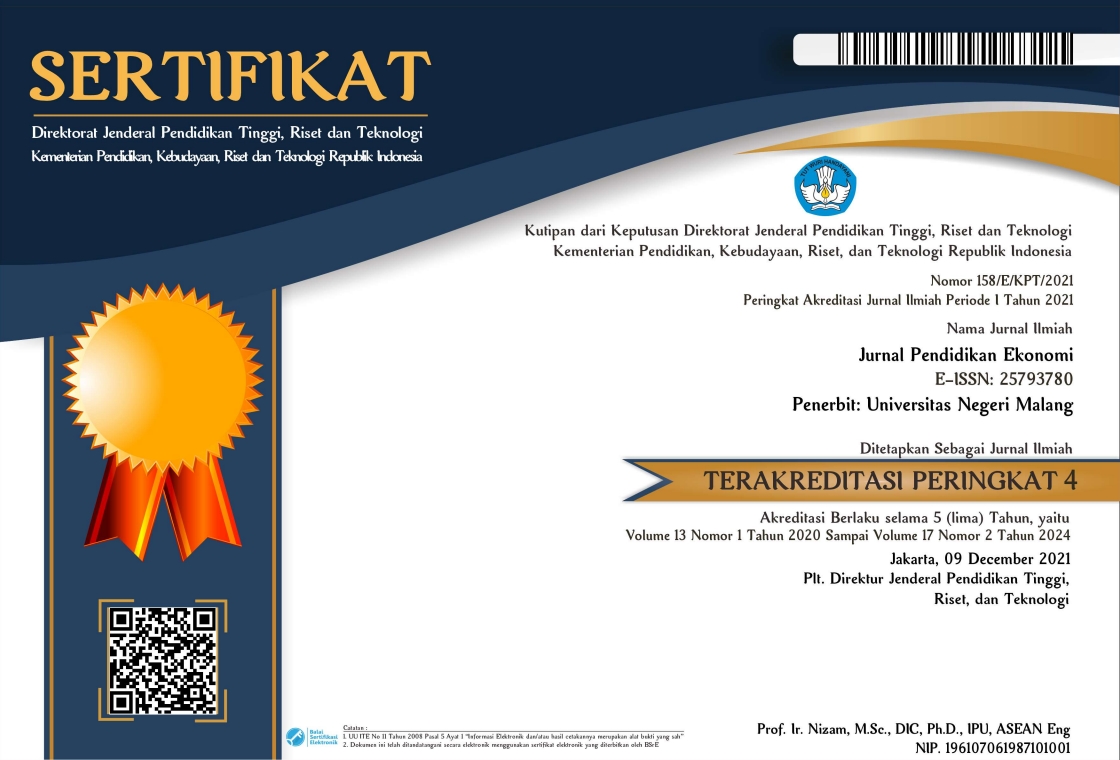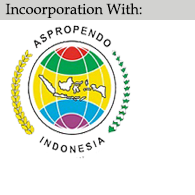Economics Analysis of Differences in Tax Aggressiveness Before and After Tax Amnesty and Influencing Factors
Abstract
Keywords: tax amnesty, tax aggressiveness, tax rate, economics learning
Full Text:
PDFReferences
Anggraini, Y., & Widarjo, W. (2020). Political connection, institutional ownership and tax aggressiveness in Indonesia. European Journal of Business and Management Research, 5(5). https://doi.org/10.24018/EJBMR.2020.5.5.528
Bayer, R. C., Oberhofer, H., & Winner, H. (2015). The occurrence of tax amnesties: Theory and evidence. Journal of Public Economics, 125, 70–82. https://doi.org/10.1016/J.JPUBECO.2015.02.006
Chen, X. (2017). Corporate social responsibility disclosure, political connection and tax aggressiveness: Evidence from China’s capital markets. Open Journal of Business and Management, 6(1), 151–164. https://doi.org/10.4236/OJBM.2018.61010
Christie, E., & Holzner, M. (2006). What explains tax evasion? An empirical assessment based on European Data. https://www.econstor.eu/handle/10419/203905
Dowling, G. R. (2014). The curious case of corporate tax avoidance: Is it socially irresponsible? Journal of Business Ethics, 124(1), 173–184. https://doi.org/10.1007/S10551-013-1862-4/METRICS
Fauzi, I., & Ani, D. A. (2023). Pengaruh pengetahuan pajak dan tax amnesty terhadap kepatuhan wajib pajak. AKUA: Jurnal Akuntansi dan Keuangan, 2(1), 74–79. https://doi.org/10.54259/AKUA.V2I1.1419
Firdaus, F. A., Nurlaela, S., & Masitoh, E. W. (2021). Institutional ownership, audit quality, gender diversity and political connection to tax aggressiveness in Indonesia. Jurnal AKSI (Akuntansi dan Sistem Informasi), 6(2), 91–100. https://doi.org/10.32486/AKSI.V6I2.91
Ghozali, I. (2021). Aplikasi Analisis Multivariate dengan Program IBM SPSS 26 (H. S. Apriya, Ed.; 10th ed.). Badan Penerbit Universitas Diponegoro.
Gita, R. S., & Hidayatulloh, A. (2019). Determinants of compliance with personal tax obligation: Do tax amnesty play? ACCRUALS (Accounting Research Journal of Sutaatmadja), 3(2), 259–267. https://doi.org/10.35310/ACCRUALS.V3I2.57
Hair, J. F., Hult, G. T. M., Ringle, C. M., Sarstedt, M., Danks, N. P., & Ray, S. (2021). Partial least squares structural equation modeling (PLS-SEM) Using R. https://doi.org/10.1007/978-3-030-80519-7
Hair, J. F., Risher, J. J., Sarstedt, M., & Ringle, C. M. (2019). When to use and how to report the results of PLS-SEM. European Business Review, 31(1), 2–24. https://doi.org/10.1108/EBR-11-2018-0203/FULL/XML
Inasius, F., Darijanto, G., Gani, E., & Soepriyanto, G. (2020). Tax compliance after the implementation of tax amnesty in Indonesia. 10(4). https://doi.org/10.1177/2158244020968793
Johnson, S., & Mitton, T. (2003). Cronyism and capital controls: Evidence from Malaysia. Journal of Financial Economics, 67(2), 351–382. https://doi.org/10.1016/S0304-405X(02)00255-6
Khan, M. A., & Nuryanah, S. (2023). Combating tax aggressiveness: Evidence from Indonesia’s tax amnesty program. Cogent Economics & Finance, 11(2). https://doi.org/10.1080/23322039.2023.2229177
Kock, N. (2023). WarpPLS User Manual: Version 8.0. www.scriptwarp.com
Kurniawati, L. (2017). Tax amnesty upaya memperkuat penerimaan negara sektor Pajak.
Nizmah, N., Santoso, B. I., Maryam, M., Sihombing, S., Jihan, J., & Kamaluddin, S. (2022). Pengaruh sistem self-assessment dan tax amnesty terhadap kepatuhan wajib pajak di pos pemeriksaan pratama Jakarta Tebet. Scientific Journal of Reflection: Economic, Accounting, Management and Business, 5(2), 393–400. https://doi.org/10.37481/SJR.V5I2.474
Ogbeide, I. O., Anyaduba, J. O., & Akogo, O. U. (2022). Firm attributes and corporate tax aggressiveness in Nigeria. American Journal of Finance, 7(2), 64–87. https://doi.org/10.47672/AJF.1100
Pradhana, A. Z., & Nugrahanto, A. (2021). Agresivitas pelaporan keuangan dan penghindaran pajak. Jurnal Pajak Indonesia (Indonesian Tax Review), 5(2), 90–101. https://doi.org/10.31092/JPI.V5I2.1376
Pratama, A. (2017). Company characteristics, corporate governance and aggressive tax avoidance practice: A study of Indonesian companies. Review of Integrative Business and Economics Research, 6, 70. http://buscompress.com/journal-home.html
Pratiwi, M., & Marlinah, A. (2021). Pengaruh tax amnesty dan faktor lainnya terhadap kepatuhan wajib pajak. E-Jurnal Akuntansi TSM, 1(3), 275–286. https://jurnaltsm.id/index.php/EJATSM/article/view/1215
Putri, D. A., Putri, A. A., & Anriva, D. H. (2022). Pengaruh sistem perpajakan, pemeriksaan pajak, keadilan pajak, dan tarif pajak terhadap etika penggelapan pajak (Studi Kasus Kantor Pelayanan Pratama Tampan). Research in Accounting Journal (RAJ) , 2(5), 675–683. https://doi.org/10.37385/RAJ.V2I5.1602
Sadjiarto, A., Florencia, F., & Nevanda, O. (2019). Effects of political connections and corporate governance on tax aggressiveness in Indonesian service and banking sectors. The Asian Institute of Research Journal of Economics and Business, 2(1), 190–204. https://doi.org/10.31014/aior.1992.02.01.79
Said, E. W. (2017). Tax policy in action: 2016 Tax amnesty experience of the Republic of Indonesia. Laws, 6(16), 16. https://doi.org/10.3390/LAWS6040016
Saptono, P. B., Mahmud, G., Salleh, F., Pratiwi, I., Purwanto, D., & Khozen, I. (2024). Tax complexity and firm tax evasion: A cross-country investigation. Economies, 12(5), 97. https://doi.org/10.3390/ECONOMIES12050097
Setyastrini, N. L. P., Subekti, I., & Prastiwi, A. (2021). Corporate governance and political connection towards the tax aggressiveness of manufacturing companies in Indonesia. International Research Journal of Management, IT and Social Sciences, 8(1), 102–109. https://doi.org/10.21744/irjmis.v0i0.000
Uchitelle, E. (1989). The effectiveness of tax amnesty programs in selected countries. Quarterly Review, 14, 48–53. https://ideas.repec.org/a/fip/fednqr/y1989iautp48-53nv.14no.3.html
UNCTAD. (2019). World Investment Report.
Wang, Y. K., Zhang, L. I., & Ho, W.-M. (2020). Tax amnesty and secondary tax evasion. Acta Oeconomica, 70, 123–139. https://doi.org/10.1556/032.2020.00007
DOI: http://dx.doi.org/10.17977/UM014v17i2p160
Refbacks

Jurnal Penddidikan Ekonomi is licensed under a Creative Commons Attribution-NonCommercial-ShareAlike 4.0 International License





